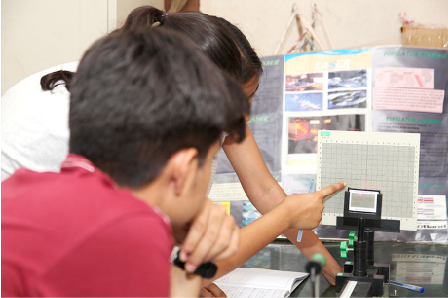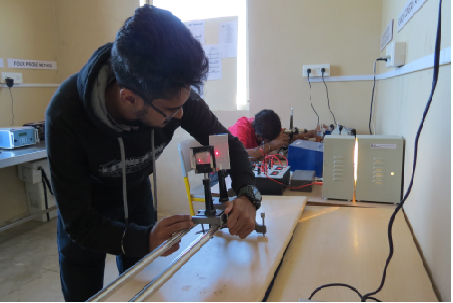Announcement
Get Ready for INDUS CUP 2K26! | Dates: 5–10 January 2026 | Stand a Chance to Win Cash Prizes up to ₹10,00,000!...Read more Get Ready for INDUS CUP 2K26! | Dates: 5–10 January 2026 | Stand a Chance to Win Cash Prizes up to ₹10,00,000!
We are excited to announce the Indus Hackathon 2025, an exhilarating one-day event organized by the CSE Department of Indus University....Read more We are excited to announce the Indus Hackathon 2025, an exhilarating one-day event organized by the CSE Department of Indus University.
26th ISTE Faculty Annual State Convention will be held at Indus University on April 27, 2023....Read more 26th ISTE Faculty Annual State Convention will be held at Indus University on April 27, 2023.
Get Ready for INDUS CUP 2K26! | Dates: 5–10 January 2026 | Stand a Chance to Win Cash Prizes up to ₹10,00,000!...Read more Get Ready for INDUS CUP 2K26! | Dates: 5–10 January 2026 | Stand a Chance to Win Cash Prizes up to ₹10,00,000!
We are excited to announce the Indus Hackathon 2025, an exhilarating one-day event organized by the CSE Department of Indus University....Read more We are excited to announce the Indus Hackathon 2025, an exhilarating one-day event organized by the CSE Department of Indus University.
26th ISTE Faculty Annual State Convention will be held at Indus University on April 27, 2023....Read more 26th ISTE Faculty Annual State Convention will be held at Indus University on April 27, 2023.
Indus University offers a 4-year undergraduate course in B.Sc. Physics (honors) as per NEP guidelines. 4 Year B.Sc. course includes major and minor courses of the physics domain along with various value-added and skill-enhancement courses in the curriculum. In B.Sc. Physics, students will learn the fundamentals of physics and its various properties like energy or force, and also the foundation knowledge possible for a Science-based career.
Indus University's B.Sc. Physics program is a great opportunity for students who are interested in exploring the fundamental principles that govern the universe. With dedicated & experienced faculty and hands-on experiments, students can gain a deep understanding of the subject matter and prepare themselves for a range of career paths in fields like Astrophysics, Material Science, Electronics, Theoretical Physics, Data Science, Space Science, Remote Sensing, Semiconductor and beyond.
The curriculum consists a combination of core theory, laboratory exercises, as well as Ability Enhancement Elective (AEC) and Skill Enhancement Courses (SEC) offerings i.e. MATLAB, Python, C++ etc. Spanning eight semesters, it encompasses Core Courses (CC), Discipline Specific Elective (DSE), and Generic Elective (GE) programs, alongside rigorous laboratory practical sessions and Research Exposures under the guidance of doctorate and qualified faculty.
Upon finishing this course, students will have the opportunity to pursue careers in both the public and private sectors. Graduates can choose to work in a variety of fields, including academic institutions such as schools, colleges, and universities, as well as government research agencies, electronics-based companies, material science-based companies, content development companies, and other industries & banking sectors. The average salary range for a B.Sc. Physics graduate is more than 4 LPA.
Students can get online admission based on merit or they can simply walk in and after the interaction, they can get approval from the Admission Committee.
The criteria that the students should follows are:-
-Students obtained education from recognized Higher Secondary boards
-Students should have completed 10+2 in science stream, with mathematics or with biology group.
Indus University aims to provide students with excellent infrastructural facilities and laboratories for the students to practice. Apply the basic principles and fundamentals of Physics to the real world. Here, students get to learn problem-solving skills to tackle both analytical and technical issues.
In this course, students would be able to understand Basic experiments of modern physics, along with the basic physics of heat and temperature and their relation with energy, work, radiation, and matter. Students are introduced to experimental physics techniques in this course. Laboratory methods will be highlighted, with a focus on how crucial accurate measurements are. Specialization subjects are offered in the curriculum in various specialization area like Nano Science, Astro Physics, Atmospheric Science, Computational Physics, C & C++ Programming, Semiconductors etc. A research project component would be carried out in the specialization area as per the interest of the student, Which will be beneficial to understanding the application and research aspect of the Physics stream. Students would be able to apply the essential standards and basics of Physical science to this present world. People who have earned a B.Sc. in Physics can find employment in any of the numerous professions that use physics.
Indus University aims to provide students with excellent infrastructural facilities and laboratories for the students to practice. Apply the basic principles and fundamentals of Physics to the real world. Here, students get to learn problem-solving skills to tackle both analytical and technical issues.
In this course, students would be able to understand Basic experiments of modern physics, along with the basic physics of heat and temperature and their relation with energy, work, radiation, and matter. Students are introduced to experimental physics techniques in this course. Laboratory methods will be highlighted, with a focus on how crucial accurate measurements are. A project component would be carried out in the last semester of B.Sc program , which will be beneficial to understand the application and research aspect of the Physics stream. Students would be able to apply the essential standards and basics of Physical science to this present world. People who have earned a B.Sc in Physics can find employment in any of the numerous professions that use physics.
Indus University has an autonomous vertical - Training & Placement Department (T & P Dept.) - that connects two vital ends: education and the industry. It exemplifies a link between schools and university constituent associations (entry-level input) and the sector (output-end at the finishing level).
The Training and Placement Department was established in 2006. It was previously affiliated with the Indus Institute of Technology & Engineering until becoming a part of the Indus University in 2012.
The Training and Placement Department is the hub for career assistance for students from all programmes and streams at the university. It provides students with overall career solutions by encouraging them to choose and pursue their ideal vocations.
T& P cell, Indus University invites several related companies/Industries/recruiters in the campus and provides the platform for the students to get an career opportunity in their field.
What are the career and job opportunities after B.Sc Physics?
B.Sc Physics prepares candidates can get a wide range of jobs from quality control manager, professor, researcher, statistician, technician, academic counselor, etc.
What are the benefits of B.Sc physics?
After B.Sc Physics you can choose to go into any field of your interest, enroll into post graduate courses like research field or engineering. And even have the scope of getting a job in the private or public sector.
Can a non-math student do BSc in physics?
The answer is yes. A student should have completed 12th from a recognised board in science to get admission.
Is B.Sc Physics difficult?
B.Sc Physics is not a difficult but challenging subject, which can be interesting with few basic tips and a little practice through experimental methods to demonstrate physics.
Students will be benefitted at Indus University for higher studies i.e. M.Sc. Physics , Ph.D. Physics. Indus University absorbs students with good academic records for various faculty positions and even provides opportunities for pursuing Ph.D and higher education through research opportunities at Indus or outside (ISRO, etc.)

An imaginative educational plan of this program will empower understudies..

An imaginative educational plan of this program will empower understudies..